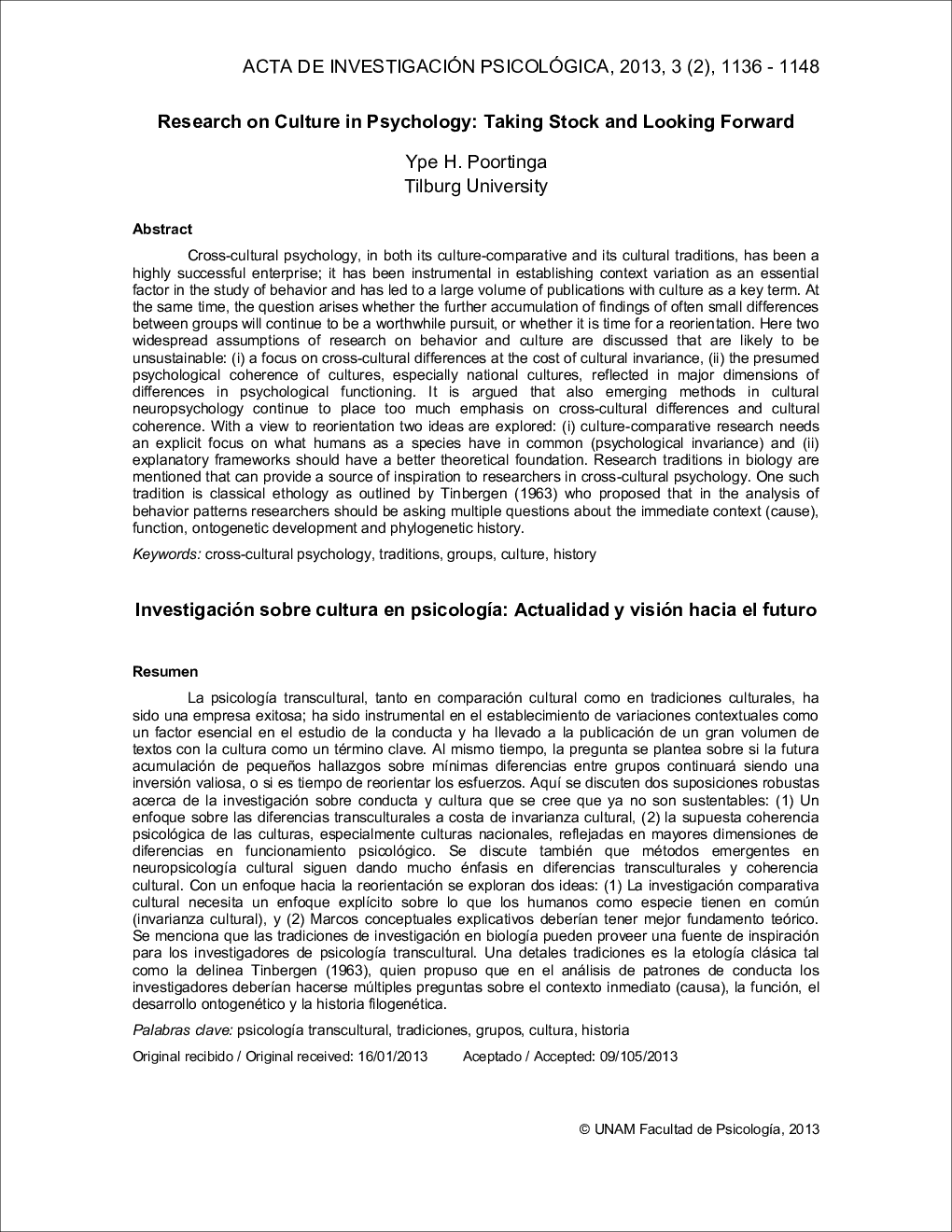| کد مقاله | کد نشریه | سال انتشار | مقاله انگلیسی | نسخه تمام متن |
|---|---|---|---|---|
| 879113 | 911338 | 2013 | 13 صفحه PDF | دانلود رایگان |

Cross-cultural psychology, in both its culture-comparative and its cultural traditions, has been a highly successful enterprise; it has been instrumental in establishing context variation as an essential factor in the study of behavior and has led to a large volume of publications with culture as a key term. At the same time, the question arises whether the further accumulation of findings of often small differences between groups will continue to be a worthwhile pursuit, or whether it is time for a reorientation. Here two widespread assumptions of research on behavior and culture are discussed that are likely to be unsustainable: (i) a focus on cross-cultural differences at the cost of cultural invariance, (ii) the presumed psychological coherence of cultures, especially national cultures, reflected in major dimensions of differences in psychological functioning. It is argued that also emerging methods in cultural neuropsychology continue to place too much emphasis on cross-cultural differences and cultural coherence. With a view to reorientation two ideas are explored: (i) culture-comparative research needs an explicit focus on what humans as a species have in common (psychological invariance) and (ii) explanatory frameworks should have a better theoretical foundation. Research traditions in biology are mentioned that can provide a source of inspiration to researchers in cross-cultural psychology. One such tradition is classical ethology as outlined by Tinbergen (1963) who proposed that in the analysis of behavior patterns researchers should be asking multiple questions about the immediate context (cause), function, ontogenetic development and phylogenetic history.
ResumenLa psicología transcultural, tanto en comparación cultural como en tradiciones culturales, ha sido una empresa exitosa; ha sido instrumental en el establecimiento de variaciones contextuales como un factor esencial en el estudio de la conducta y ha llevado a la publicación de un gran volumen de textos con la cultura como un término clave. Al mismo tiempo, la pregunta se plantea sobre si la futura acumulación de pequeños hallazgos sobre mínimas diferencias entre grupos continuará siendo una inversión valiosa, o si es tiempo de reorientar los esfuerzos. Aquí se discuten dos suposiciones robustas acerca de la investigación sobre conducta y cultura que se cree que ya no son sustentables: (1) Un enfoque sobre las diferencias transculturales a costa de invarianza cultural, (2) la supuesta coherencia psicológica de las culturas, especialmente culturas nacionales, reflejadas en mayores dimensiones de diferencias en funcionamiento psicológico. Se discute también que métodos emergentes en neuropsicología cultural siguen dando mucho énfasis en diferencias transculturales y coherencia cultural. Con un enfoque hacia la reorientación se exploran dos ideas: (1) La investigación comparativa cultural necesita un enfoque explícito sobre lo que los humanos como especie tienen en común (invarianza cultural), y (2) Marcos conceptuales explicativos deberían tener mejor fundamento teórico. Se menciona que las tradiciones de investigación en biología pueden proveer una fuente de inspiración para los investigadores de psicología transcultural. Una detales tradiciones es la etología clásica tal como la delinea Tinbergen (1963), quien propuso que en el análisis de patrones de conducta los investigadores deberían hacerse múltiples preguntas sobre el contexto inmediato (causa), la función, el desarrollo ontogenético y la historia filogenética.
Journal: Acta de Investigación Psicológica - Volume 3, Issue 2, August 2013, Pages 1136–1148